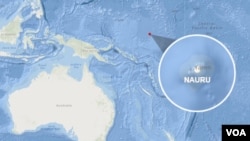Officials in Nauru say more than 180 people have been arrested after protests by refugees released from the island’s Australian-run detention center. Many are angry at living conditions on the South Pacific island and their treatment by locals. About 400 people have been released from the Australian-run detention camp on Nauru to live in the community after being given refugee visas by the Nauruan government.
But despite being outside the razor wire fences, unrest is fomenting in the tiny Pacific republic.
Hundreds of refugees have held public rallies demanding better living conditions. Nauruan authorities say 183 refugees have been arrested and are being detained at the country's correctional facility following recent protests.
The government has accused asylum campaigners of stoking the unrest to win public support.
Ian Rintoul, from the Refugee Action Coalition in Sydney, rejects the accusation. He said the police on Nauru have been heavy-handed.
“It's quite clear that the police were responding or concerned about the fact that there was going to be a demonstration this afternoon. They've circulated, you know, threatening notices yesterday saying that people could get up to three year's jail for being involved in protests. Police actually went personally to some of the compounds and told them they would not be allowed to have protests anywhere except inside, you know, their compound,” said Rintoul.
The offshore processing center was opened by Australia following a deal with Nauru in 2001 to house asylum seekers arriving by sea.
The camp was closed in 2008 by the Labor government, which had won an election the previous year. But under growing political pressure because of a steady flow of boat people arriving in Australia, the left-of-center administration reopened the South Pacific facility four years later. Iranians, Pakistanis and Somalis now are among those refugees resettled on the tiny island with a native population of about 11,000.
Australia also sponsors a second camp on Manus Island in Papua New Guinea.
Both centers have been plagued by unrest and protests, including riots, hunger strikes and allegations of sexual abuse.
Under current policy, asylum seekers sent to Pacific camps will not be resettled in Australia even if their refugee claims are approved. The government stresses this is part of a plan to deter asylum seekers from trying to reach Australia.
Critics, however, insist it will add to social and economic pressures on poorer countries. Nauru has an unemployment rate estimated to be around 90 percent. Its health system is straining under the weight of an obesity crisis, and the tiny republic mostly relies on foreign aid to survive.







